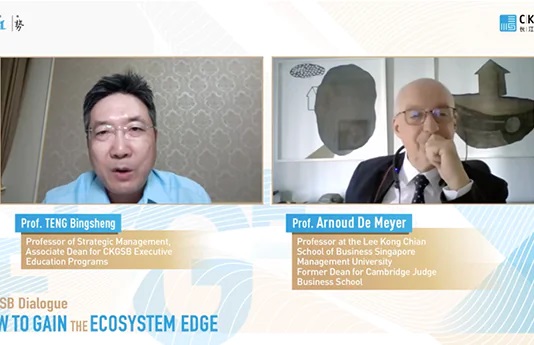Family business succession planning is always tricky. In China it is also fraught with cultural complexities.
Today’s China is filled with stories of people who took a few ordinary things—a bicycle, a sewing machine, and an idea, say—and transformed them into a fortune. Now many of these founders are reaching an age where they want to pass on what they have built to their sons or daughters.
This should be a proud, happy moment for the family. Sometimes it is. But more often, it’s extremely stressful: surveys have found that nearly 80% of children of family business owners in China do not want to join the family business, according to Roger King, Adjunct Professor of Finance and Director of the Tanoto Center for Asian Family Business and Entrepreneurship Studies at Hong Kong University of Science and Technology.
Business succession is never easy, but experts say it may prove especially challenging between the first and second generations of today’s family-owned companies because their life experiences have been so different. “In addition to the traditional father and offspring conflicts, you also have a cultural element in these conflicts,” explains King.
Many founders began their life in humble circumstances, if not outright poverty, while their children have always known affluence, Chinese succession experts say. They have had very different lives as a result. The founders often had little opportunity for anything but work, unlike their children, many of whom have spent years abroad in plush Western boarding schools and universities.
This means that the two generations look at the same business in very different ways. The first generation is more likely to view the story of the company as the start of a family saga, while for the second, it’s just what mom and dad did, experts say. That second generation sees joining the family business more as akin to volunteering for a life sentence at the family factory than as an opportunity. Members of the younger generation tend to look for more personal fulfillment or find that their heads have been turned by the lucrative opportunities open to bilingual Chinese speakers.
Western family companies tend to solve this problem by bringing in outside managers. However, founders of Chinese companies typically don’t like the idea of bringing in non-family members as managers. Traditionally, even extended families have tended to be very tightly connected in China, and where a Western business person might see an opportunity to bring in some fresh executive talent, the founder is more likely to see a source of risk.
Even family businesses that have gone public tend to be reluctant to hand the reins over to anyone outside the family circle, according to King.
“Such tightly connected and extended family relationships in China are a major dynamic in mitigating long-term risk for the collective members,” explains Wayne Brockbank, a consultant and Clinical Professor of Business at the Ross School of Business at the University of Michigan.
Overall, family-focused defensive concerns tend to be a more important motivation than they are in Western family businesses. Expensive Western educations, for instance, are motivated not only out of a desire to give their children a good education, but also as a way to hedge the family’s bets by giving their children a second home. Success at the local level is often predicated on the favor of local officials. Lose that, he says, and you can lose everything. “If this is how you manage your business, the only way you have access to markets is through your social capital… if something changes, everything can be gone,” King says.
The one-child policy exacerbates the pressure on the next generation, experts say. Elsewhere in Asia, siblings give the patriarch some choices in succession, but not in China. “The parents look at their sole child, single child, the young emperor, as the person who is going to go in and take over the business,” says Patrick B. Trainor, Managing Director at Cornerstone Strategic Partners, a Hong Kong financial management advisory firm.
But the challenges don’t end if the son or daughter does return to the fold. One common problem, Trainor says, is that they are brought into the family business straight out of school.
“When the father or mother is running a business, the very best education they can give is to force the child to work outside the company,” says Trainor. “I think it’s a grave mistake to bring a child fresh out of university or fresh out of grad school into the family business.”
There are a number of problems with joining the family firm right away, in Trainor’s view. “First of all, the young adult can’t really add anything to the parent’s business,” he says. He or she is also likely to be surrounded by yes-men who are afraid to correct him. Even worse, he adds, “you’re going to be afraid of making decisions because you’re afraid of making a mistake.”
Instead, Trainor advises that family business scions spend five years working for another company—maybe in another industry, and even another country. They need to know what it’s like to work as an ordinary employee, and they need to have a chance to make mistakes. Often, sliding right in to a big job can make it difficult for the son or daughter to develop real managerial expertise and the confidence he or she will need to be a successful leader.
There are other sources of generational friction as well. Often, children are more acquainted with contemporary management ideas than their father, but the father may see no need to change a tried and true system. The first generation is often very hierarchical, where the new generation is likely to see merit as the prime reason for a promotion, according to King.
Long-lived founders are another challenge: as life expectancies lengthen, some children who were rushed back to the business right after university find themselves in a difficult situation when they reach their mid-30s and 40s: at an age when most of their peers are achieving positions of authority, they may still be seen—and treated—by the boss as a permanent heir apparent. “It’s absolutely miserable for them as they get older,” Trainor says.
This can cause some long-term emotional damage, according to King: “If you’ve been working with Dad the last 30-40 years and he’s always been telling you you’re doing everything wrong, you don’t have a lot of self-confidence.”
An added challenge, of course, is that these families are still making the rules up as they go along—just as they were in the 1980s. Unlike those in the West or Japan, Chinese family businesses have few examples to benchmark against. This is obviously the case within the People’s Republic, but it seems to be true for the Chinese diaspora as well: King says that he and his fellow researchers have been unable to find even 15 family businesses run by ethnic Chinese anywhere in the world that are more than 100-years-old and bring in more than $100 million in revenue.




















